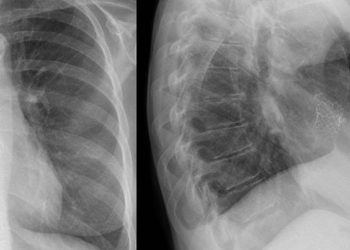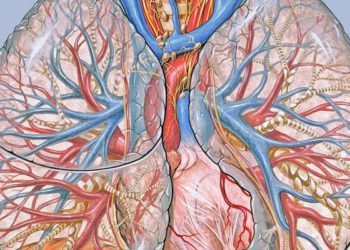Three months of antibiotics appear to effectively treat early-onset spinal implant infections
Image: PD
Key study points:
1. Treating early-onset spinal implant infections with early debridement and a three month course of antibiotics yielded a 2-year survival rate of 88%.
2. This study was non-comparative, and did not clearly demonstrate equal or superior efficacy to other therapeutic options such as hardware removal and longer antibiotic courses.
Primer: Early-onset orthopedic hardware infections occur < 3 months after surgery and are most often caused by Staphylococcus aureus and gram negative rods.
Therapy for these infections typically includes removal of the hardware device, debridement, and long-term antibiotic therapy. For instances in which the hardware is retained, many advocate treatment with parenteral antibiotics for 6 weeks followed by 3-6 months of oral therapy. Such treatments can cause a great deal of morbidity, and thus the duration and modality of antibiotics remain controversial.
As the spine is well vascularized and well penetrated by antibiotics, shortening the duration of antibiotics is a rational course of action.
This study’s authors therefore investigated the efficacy and safety of a shorter antibiotic course for early-onset spinal infections combined with debridement and hardware retention.
Background reading:
1. The Management and Outcome of Spinal Implant Infections: Contemporary Retrospective Cohort Study.
2. The diagnosis and management of infection following instrumented spinal fusion.
This [prospective] study recruited 50 patients from a single hospital specializing in complex spinal surgery. Patients were included if they were > 16 years old and had evidence of deep infections arising within 30 days after spinal surgery. All patients were quickly debrided, with necrotic and infected tissue excised and washed. Antibiotics were initiated during debridement surgery and consisted of 2 weeks of either empiric anti-staphylococcal agents or regimens tailored to the susceptibility of an isolated pathogen. After 2 weeks, patients were switched to 10 additional weeks of oral therapy unless intravenous antibiotics were required due to susceptibility. At a follow-up time of 2 years, 44 patients (88%) were cured with no reinfection or relapse, 3 patients died of unrelated causes, and 3 patients experienced reinfection or relapse. 81% of infections were caused by Staphylococcus aureus, of which 6% were methicillin resistant.
In sum: This study demonstrates the efficacy of early debridement and a 3-month course of antibiotic therapy in early-onset spinal implant infections. The cure rate of 88% is comparable to other treatment options that yielded cure rates of around 70%. However, this study was non-comparative and several factors could have misrepresented the results. First, this center specialized in spinal surgery; therefore the timeliness and quality of the surgery and debridements may not be generalizable on the large scale. Additionally, the percentage of resistant pathogens in this study was low and may have played a role in the favorable results of the study.
Click to read the study in CID
By [AS] and [MP]
© 2012 2minutemedicine.com. All rights reserved. No works may be reproduced without written consent from 2minutemedicine.com. Disclaimer: We present factual information directly from peer reviewed medical journals. No post should be construed as medical advice and is not intended as such by the authors or by 2minutemedicine.com. PLEASE SEE A HEALTHCARE PROVIDER IN YOUR AREA IF YOU SEEK MEDICAL ADVICE OF ANY SORT.




